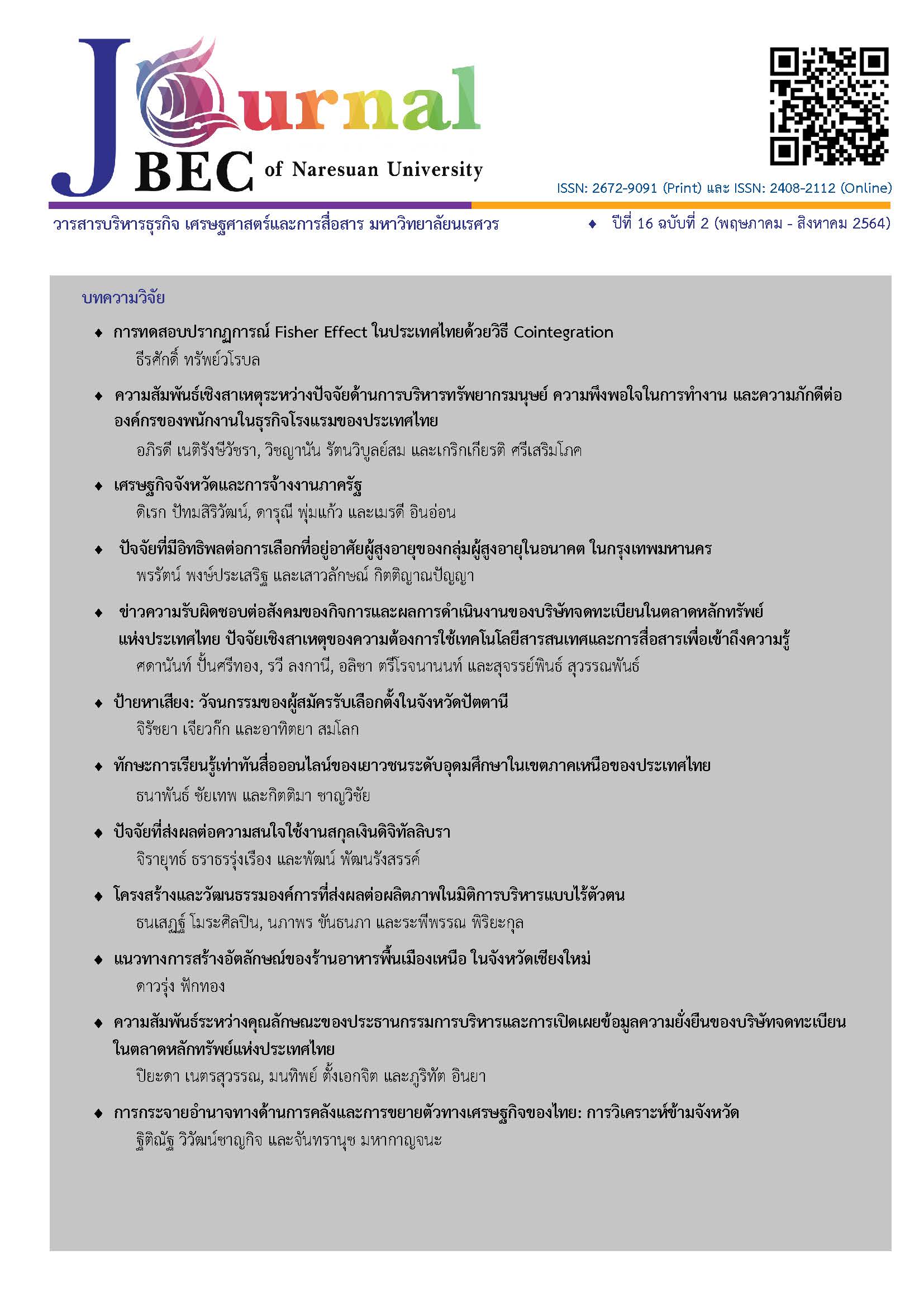ปัจจัยที่มีอิทธิพลต่อการเลือกที่อยู่อาศัยผู้สูงอายุของกลุ่มผู้สูงอายุในอนาคต ในกรุงเทพมหานคร
Main Article Content
บทคัดย่อ
งานวิจัยนี้มีวัตถุประสงค์เพื่อศึกษาปัจจัยที่มีอิทธิพลต่อการเลือกที่อยู่อาศัยผู้สูงอายุของกลุ่มผู้สูงอายุในอนาคตในกรุงเทพมหานคร เพื่อใช้เป็นแนวทางในการพัฒนาและปรับปรุงที่อยู่อาศัยสำหรับผู้สูงอายุในอนาคตได้ตรงตามความต้องการ และยังเป็นการตอบรับกลุ่มประชากรขนาดใหญ่ที่จะก้าวเข้าสู่สังคมผู้สูงอายุในอนาคต ซึ่งจะมีผลต่อโครงการอสังหาริมทรัพย์ในอนาคตต่อไป โดยงานวิจัยนี้ กลุ่มตัวอย่างเป็นกลุ่มคนอายุระหว่าง50-59 ปี ที่อาศัยอยู่ในกรุงเทพมหานคร จำนวน 400 คน การวิเคราะห์สถิติเชิงอนุมานสำหรับการอธิบายผลการศึกษา เพื่อทดสอบหาความสัมพันธ์ของปัจจัยที่มีอิทธิพลต่อการเลือกที่อยู่อาศัยผู้สูงอายุของกลุ่มผู้สูงอายุในอนาคตที่ระดับความเชื่อมั่น 95% หรือ p < 0.05 จากผลการศึกษาพบว่ามี 7 ปัจจัยที่มีอิทธิพลโดยตรงต่อการตัดสินใจเลือกที่อยู่อาศัยผู้สูงอายุในอนาคต คือ การออกแบบและติดตั้งอุปกรณ์หรือสิ่งอำนวยความสะดวกต่อผู้สูงอายุ มีสถานพยาบาลขนาดเล็กภายในโครงการ บุคลากรที่มีความรู้ความชำนาญในการช่วยเหลือ ระบบการรักษาความปลอดภัยที่เข้มงวด ทำเลที่ตั้งโครงการอยู่ใกล้รถไฟฟ้า ใกล้ตลาดหรือศูนย์การค้า การออกแบบที่พักอาศัยให้มีระดับพื้นเสมอกัน
Article Details
เอกสารอ้างอิง
Ashley, R. K. (1988). Untying the sovereign state: a double reading of the anarchy problematique. Millennium, 17(2), 227-262.
Cupchik, G. C., Ritterfeld, U., & Levin, J. (2003). Incidental learning of features from interior living spaces. Journal of Environmental Psychology, 23(2), 189-197.
Darunwat, B. (2017). The crucial factors for buying a house after retirement of the socioeconomic Status-SES class B who live in Bangkok and Metropolitan area. Master thesis, MBA. Thammasat University, Bangkok.
Department of Older Persons. (2019). Older statistics. Retrieved August 15, 2020 from http://www.dop.go.th/en/know/side/1/1/275
Glascock, A. P., & Feinman, S. L. (1980). A holocultural analysis of old age. Comparative Social Research, 3(1), 311-332.
Henseler, J., Ringle, C., and Sinkovics, R. (2009). The use of partial least squares path modeling in international marketing. Advances in International Marketing, 20, 277-320.
Jongpipitporn, P. (2015). Factors affect independent senior housing purchases in Bangkok. Master thesis, MBA. Thammasat University, Bangkok.
Krejcie, R. V., & Morgan, D. W. (1970). Determining sample size for research activities. Educational and psychological measurement, 30(3), 607-610.
Leedy, J. J., & Wynbrandt, J. (1987). Executive retirement management: A manager's guide to the planning and implementation of a successful retirement. New York: Facts on File.
Leepaibul, R. and Tochaiwat, K. (2011). The requirements of the physical aspects of elderly housing projects. Master thesis, M. Arch., Thammasat University, Bangkok
Lertwannapong, T. (2011). Factors influence to satisfaction of baan ploenchit apartment’s residents. Master thesis, MBA. Srinakharinwirot University.
Mohit, M. A., & Raja, A. M. M. A.-K. (2014). Residential satisfaction-concept, theories and empirical studies. PLANNING MALAYSIA, 12(3).
Moksony, F. (1999). Small is beautiful. The use and interpretation of R2 in social research. Szociológiai Szemle, Special issue. 130-138.
Ngamyan, A. and Phaophu, N. (2012). Thai senior citizens: Financial preparation for retirement and required retirement housing features. Business Administration Journal, 35 (136), 62 - 87.
Nunnaly, J. (1978). Psychometric theory. New York: McGraw-Hill.
Office of the Civil Service Commission. (2018). Government and Preparation for facing the aging society. Journal of Civil Service Commission, 60 (4), 1-25.
Office of the National Economic and Social Development Council (2019). Report of the Population Projections for Thailand 2010-2040 (Revision). Retrieved 10 August 2020 from http://dcy.go.th/webnew/ebook/
Orimo, A., & Weinberg, R. A. (2006). Stromal fibroblasts in cancer: a novel tumor-promoting cell type. Cell cycle, 5(15), 1597-1601.
Saengwimolmas, N. and Panichpathom, S. (2018). The attributes preferences on elderly condominium: pre-retirement. 13th academic research presentation conference
, Bangkok.
Si, P. T. (2012). Key factors affecting house purchase decision of customers in Vietnam. Master Thesis, MBA., University of Economics Ho Chi Minh City, Ho Chi Minh City,
Vietnam.
Siripanich, B. (2006). Manual Aging. Bangkok: Villager doctor.
Siriwongpakhon, S. (2013). A study of media exposure behavior to relation with elderly of self-reliance in Bangkok Metropolis. Bangkok. Retrieved 12 August, 2020 from https://repository.rmutp.ac.th/bitstream/ handle/123456789/1248/MCT_56_04.pdf
Sudsan, S. (2006). Housing preparation of elderly living in residential condominiums of the national housing authority's housing estates, the Bangkok Metropolitan area.
Master thesis, M. Arch. (Housing Development), Chulalongkorn University, Bangkok.
Suphotngamkul, Y. (2014). Using importance-performance analysis (IPA) to evaluate factors affecting the living in elderly condominium. Master thesis, MBA. Thammasat
University, Bangkok.
Sukprasert, S. (2015). Standards residential and public facilities for seniors. Master thesis, M. Civil Eng., Suranaree University of Technology, Nakorn Ratchasrima.
Taweesit, S. and Bunyamanon, S. (2010). Value of the Elderly from the Eyes of Thai Society. Nakhon Pathom: Institute for Population and Social Research Mahidol University.
Tonglor, T. (2561). Why should seniors change their lifestyles, move from home to condominium?. Retrieved 20 March, 2020 from http://propholic.com/prop-talk/
Uotinen, V., Rantanen, T., & Suutama, T. (2005). Perceived age as a predictor of old age mortality: A 13-year prospective study. Age and Ageing, 34(4), 368-372.
Wapattanapong, P., Prasatkul, P. (2006). Thai population in the future. Retrieved August 15, 2020, from https://ipsr.mahidol.ac.th/ipsr/AnnualConference/


